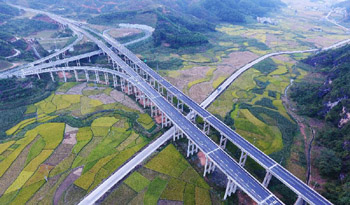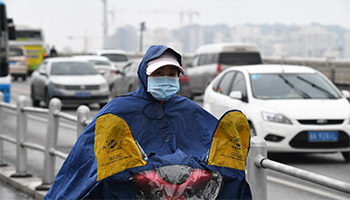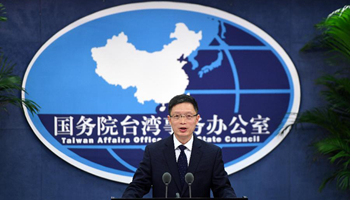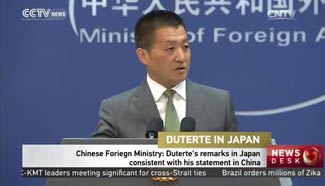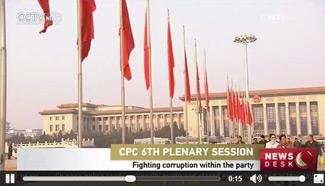By Chris Dalby
QUITO, Oct. 26 (Xinhua) -- The UN's Habitat conferences have more pressure on them to succeed than most. Happening once every 20 years, the third iteration, Habitat III, wrapped up in Quito last week with the adoption of the New Urban Agenda.
The UN hailed the New Urban Agenda as a roadmap to offer equal opportunities to all citizens in cities, to improving air quality, and to improving basic services. The concept of Smart Cities featured prominently in Quito, including the use of new technologies in urban development.
However, while numerous participants detailed different ideas on how to harness technology to tackle urban challenges but the final document of the Agenda did not necessarily reflect that. Perhaps due to the complexity of finding common solutions to boundlessly diverse realities, the New Urban Agenda was felt to be lacking specifics.
"While the New Urban Agenda did a great job of bringing a worldwide consensus about the challenges we face in the coming two decades, its reference to the role of technology and data was shy of clear actions. There is a clear mention -though modest- of the role of technology and data moving forward," said Charbel Aoun, a non-executive director at Future Cities Catapult, a British organization supporting the development of smart cities.
"I expected more specific answers...as opposed to echoing a globally acknowledged consensus and potential value coming from more structured and committed use of data," he said in an interview to Xinhua.
Aoun echoed other experts in explaining that the worldwide spread of technology and its runaway development are essential to the democratization of solutions to urban problems. While numerous areas around the world lack access to electricity, clean water, safe transportation, or healthcare, cell phones have become ubiquitous.
"These smart devices have broken the digital divide and economic disparity. We are being offered a unique access to people and people are being offered a unique access to a world of info via this little screen," explained Aoun.
Numerous technological solutions have been suggested for how people could interact with their urban environment as the foundation of smart cities. Pollution in China and beyond has already seen apps providing air contamination levels surge in popularity. However, this is but scratching the surface of the integrated information that could be provided.
Air quality could be joined by reams of public data, including restaurant inspection results, museum opening hours, transport timetables and parking information.
Another aspect of smart cities that has not been widely discussed is that of private adoption of facilities. The likes of Uber and Airbnb have arisen from private initiatives to carpool and couch-share. The same spirit of goodwill could be rolled on a different scale.
If someone lives next to some public greenery, they can "adopt" it and take care of its maintenance, saving the city money. If a bus shelter has been spray-painted, someone can register that they will clean it on their own time.
Ana Gonzalez is executive director of COPEVI, an influential housing NGO, which was part of the Mexican delegation to Habitat III. She sees such ideas taking slowly hold in the country. "In Mexico City, and perhaps in other cities of the country, more technology is constantly entering to supervise administration and government procedures, mobility and public security," she explains.
However, Gonzalez points out that such options lie in the hands of those who have access to the right technology and WiFi. "There is still a long way to go to see the true inclusion of poor women and children. Infrastructure in their neighborhoods, schools and offices is still deficient."
Gonzalez hints at a real problem that may be at odds with some of the priorities outlined at Habitat III. While smart cities technology featured prominently, more attention was given to the plague of informal settlements, such as slums.
As urban sprawl has been spurred on by a steady flow of migrants around the world, public budgets and services have struggled to keep up. This makes much of the functional technological applications of urban development moot, since they rely on at least some level of accessible and reliable data.
Juan Pablo Duhalde, director of social affairs for TECHO International, a civil organization focusing on helping those living in informal settlements, felt that Habitat III needed to focus on the broader aims.
According to Duhalde, it is a priority for Habitat III's vision to be translated into policies that improve the general of quality of life, with an emphasis on initiatives which promote fair access to quality land, basic services, removing homelessness and projects of social integration.
"Instead of smart cities, we should speak about democratic cities, which is what we need today. For this, current housing policies must be redesigned, for the great masses of standardized housing to be converted into quality housing, which allow for the buying and improvement of a home," he said.
Habitat III had a tough mission from the start, collating the experiences of urban development over the last 20 years and needing to provide guidelines for the next 20.
One word returned time and time again: democracy. Democracy in letting people participate actively in improving their urban environments and engaging with their governments. The New Urban Agenda calls on cities to be "participatory, promote civic engagement, engender a sense of belonging and ownership among all their inhabitants."
But one important question remains, which only individual cities and communities may find the answer to. Through technology, education, or social programs, as Aoun asks, how can we create a community of interested people that can come together to identify local problems, agree to solve them and decide on how to solve them?

